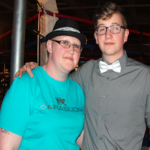An interview with Mike Lang
September 19, 2013
By: Emily Drake
In 2011 at the Canadian Association of Psychosocial Oncology’s annual meeting inToronto, I had the opportunity to do my first oral presentation at a national conference. Having been a former outpatient at a pediatric health centre, it was a unique experience for me to be on the other side of the fence talking about the experience of pediatric patients transitioning from pediatric to adult healthcare from the same institution I attended and from a research perspective.
Before my presentation started, I looked out in the audience and saw two friendly faces who had come in to listen, Mike and Bonnie Lang. I later met the Langs when they toured across Canada promoting their first adolescent and young adult cancer film, “Wrong Way to Hope.” I’ve gotten to know them over the past few years and am constantly encouraged and inspired by their desire to help cancer patients/survivors, and their novel ways of doing so.
I recently had the opportunity to catch up with Mike to ask him a little bit more about his adventure therapy organization, Survive & Thrive Expeditions.
Emily: How did you get started and when was the organization founded?
Mike: Before I was diagnosed I was an adventure guide with “at-risk” youth in Washington State. When I was going through treatment I realized that I was becoming a very bitter and angry person because of what was happening to me. I didn’t want to be that person, so my wife Bonnie and I came up with an idea to combine my life before cancer and my life after/with cancer in a way that was meaningful. That way it didn’t seem like I was going through all this pain and suffering for no reason. The idea we had was to take a group of young adult cancer survivors on a kayaking expedition on the
Owyhee River in Oregon. That trip was very successful, and led to a powerful documentary called Wrong Way to Hope: An Inspiring Story of Young Adults and Cancer (www.wrongwaytohope.com), and from there we decided do some more trips. That’s how Survive & Thrive was born! Of course all of this happened before we even heard of all the awesome organizations out there like First Descents and Athletes in
Action.
Emily: What has been the biggest challenge so far about starting your nonprofit agency?
Mike: We had a lot of the connections and expertise within the guiding world, so that part wasn’t too hard to pull together. The biggest challenge at first was finding young adult survivors to come! That is still sometimes an issue because we are a small, two person operation and don’t have the fundraising capacity to make our trips free for survivors. However, we have found out that if survivors do their own fundraising, or even pay for the trip out of their own savings, they are really invested in getting the most out of the trip. This high level of engagement makes our conversations and activities even more powerful and impacting for everyone involved.
Emily: What have been the highlights and successes you have experienced so far?
Mike: Every single trip is a highlight! Every new survivor we get to share a once in a lifetime experience with is a highlight! As far as success… In our mind these trips don’t matter one bit if it doesn’t help you live your life better. We have been able to watch people make significant positive life changes after going on a trip and to us that is the only success that matters.
Emily: How do you see Survive & Thrive growing in the upcoming years?
Mike: Hmmm… that is a good question. There are now many organizations offering adventure trips for cancer survivors around North America and we have often thought that maybe we should just back out and pass the cancer survivors we meet on to them. But, I have realized over the past five years that not one organization can meet every need and that the way we do things on Survive & Thrive trips, specifically the reflect, refocus and rebuild model, is different from the approaches of other organizations. The emphasis we place on introspection, group processing and building a life mission, in addition to the epic adventures and experiential learning activities, is something that certain young adult survivors are really drawn to. So, all that to say, we probably will keep offering 2-3 trips a year so that we can meet the needs of those survivors who are looking to go deep and process their cancer experience through group discussions and activities as well as have an incredible trip of a lifetime.
To find out more information about Survive and Thrive please go to www.survivethrive.org.





